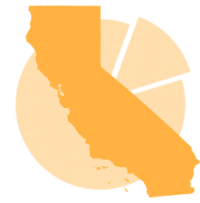Each year, California state leaders spend months proposing and refining the state’s budget, making decisions about programs and resources that directly impact students, schools, and colleges. Why does EdTrust-West follow this process closely and try to influence it? Because we know money matters for advancing racial equity and fairness in and across California’s education systems. Here we outline 5 important things to know about California’s 2024-25 State Budget process and proposals:
1. The budget process provides multiple opportunities for advocacy

While the Governor proposes an initial budget for the upcoming fiscal year in January, that proposal is adjusted and revised over multiple months. Legislators hold hearings, and receive issue-specific input from experts and advocates at those hearings, through meetings, and via advocacy letters and other approaches. EdTrust-West and partner organizations regularly engage with legislators and the governor’s team to ensure the final budget supports the success of Black, Latinx, Asian American, Pacific Islander, and Native American students as much as possible. Want to stay updated on the budget proposal and opportunities to engage? Make sure you’re on the EdTrust-West email list here.
2. Advocates have a crucial role to play in budget advocacy in a deficit year
After years of abundant revenue, California is facing a significant deficit for the 2024-25 fiscal year, and potentially multiple years. However, California has healthy reserves, options to balance the budget, and state leaders who are already working together to align on how to use those additional resources to address current gaps between expected and actual revenue. What does this mean for advocates who care about racial justice in education? That we must stand firm in making sure the budget isn’t balanced on the backs of students of color and multilingual learners, and that in addition to advocating for investments that support these students, we should also be prepared to advocate against cuts as the proposed budget moves through the process.
3. The governor’s 2024-25 state budget proposal includes funding for some important ongoing investments
Despite a drop in revenue, the governor is maintaining a commitment to several key investments that support racial equity in education in this year’s budget. The proposed 2024-25 state budget includes, for instance, millions of dollars to continue implementing transitional kindergarten and funding for community schools programming, both efforts that were established in previous budgets. Additionally, the current budget proposal includes continued funding for the Golden State Pathways Program and dual enrollment partnerships and programming, two approaches that provide crucial opportunities for high school students to access early college programs and career pathway opportunities that increase postsecondary success. EdTrust-West is also pleased that the budget proposal includes continued funding for implementing the state’s new longitudinal “Cradle-to-Career” data system, a crucial tool for state and local leaders, educators, advocates, students, families, and other stakeholders to identify and address inequities in educational opportunities and uplift and scale best practices throughout the state.
4. The current budget proposal includes a few notable policy changes and critical implementation funding, especially in TK-12 schools
Governor Newsom is proposing a significant and needed policy change to teacher preparation requirements in the 2024-25 state budget. Currently, prospective teachers are required to possess a bachelor’s degree and demonstrate basic skills competency on an assessment to be eligible for a teaching credential. The governor is proposing to eliminate the arguably duplicative basic skills competency requirement, which EdTrust-West and other advocates identified as a barrier to increasing California’s pipeline of Black, Latinx, Asian American, Pacific Islander, and Native American prospective teachers. EdTrust-West supports this effort, as well as supporting the governor’s proposal to allocate $20 million for math-focused professional development, an important implementation effort following the state’s adoption of the California Mathematics Framework last year. EdTrust-West will advocate for both efforts to ensure their inclusion in the final state budget prioritizes racial justice in education as much as possible.
5. Some elements in the governor’s proposed budget are cause for concern for education equity advocates
While the governor’s proposed budget clearly seeks to be responsive to the post-pandemic and changing landscape of California’s schools and colleges, we are concerned that a few of these proposals could negatively impact students of color. In the TK-12 system, the governor is proposing changes to how schools measure attendance, an important consideration for per-pupil funding levels. However, as written currently, the proposal lacks safeguards for ensuring quality instruction in alternative settings and does not address the root causes of chronic absenteeism. In higher education, while EdTrust-West is glad to see the proposed budget includes continued growth-informed funding for the California Community College system, the proposed delays in funding for the California State System and the University of California are worrisome. We urge the state’s leaders to offer significantly more clarity on how the delayed funding will be reinstated to these institutions, and to ensure such funding delays do not impact programs designed to increase access and success for California’s Black, Latinx, Asian American, Pacific Islander, and Native American students. Furthermore, we continue to be concerned that financial aid has not kept pace with the cost of attendance, and this budget does not provide much-needed increases to the Cal Grant program to address the rising cost of being a college student in California. As such, we will continue urging state leaders to fund reforms to the Cal Grant program that would make college more affordable for 130,000 more students in our state, many of whom are parenting students and students of color.
For more details on these 5 things, and more on what’s in Governor Newsom’s proposed 2024-25 state budget, click here to watch the recording of our recent “Money Matters” webinar, and view the presentation from that webinar here. You can also find updates on our budget advocacy, including our advocacy letters and other materials, by visiting the Government Relations section of our new website!
We’ll continue to keep you updated on how budget negotiations evolve. Join our email list here to ensure you receive updates, and follow us on Facebook, X, LinkedIn, and Instagram as well.




